If you’re looking to transform your mindset and reach your goals, I recommend exploring top coaching books like *Atomic Habits* for building lasting habits, *The Greatness Mindset* for rewiring your thoughts, and *The Coaching Habit* for effective conversations. *Best Self* and *Life Coaching Activities Workbook* offer practical tools for self-awareness and growth. Keep exploring these resources, and you’ll discover powerful insights and strategies to unleash your best self.
Key Takeaways
- These books focus on mindset shifts, self-awareness, and practical strategies to help achieve personal and professional goals.
- They include popular titles like *Atomic Habits*, *The Greatness Mindset*, and *Best Self* for ongoing growth.
- Many emphasize habit formation, self-reflection, and authentic coaching practices to foster lasting change.
- The selection caters to both self-development enthusiasts and coaching practitioners seeking impactful resources.
- The books provide actionable insights, exercises, and mindsets to transform your thinking and unlock success.
The Coaching Habit: Say Less, Ask More, and Change the Way You Lead Forever
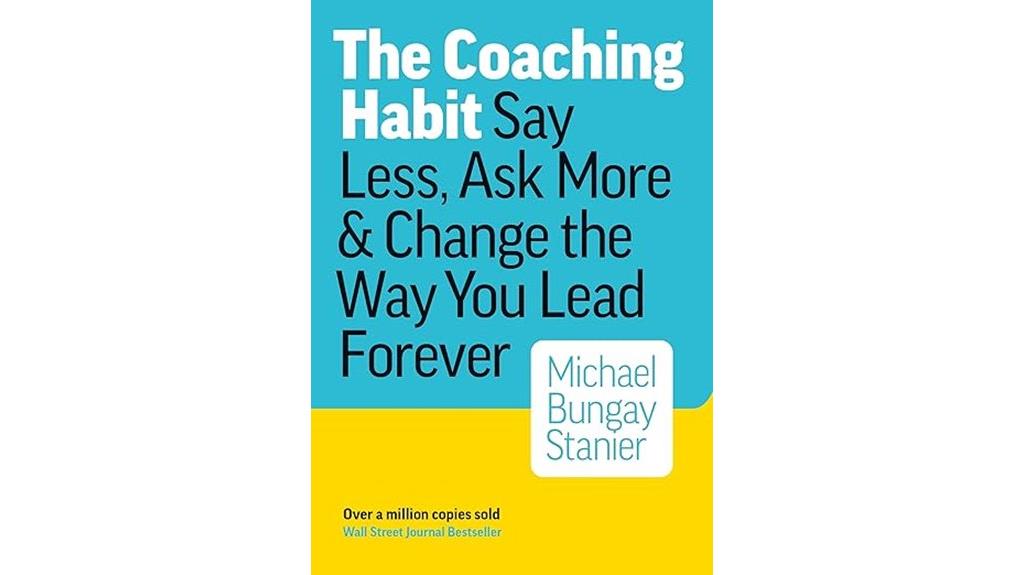
If you’re a manager looking to boost your coaching skills without becoming overwhelmed by complex theories, *The Coaching Habit* is the perfect choice. I found it straightforward and practical, focusing on asking questions, listening, and saying less. The book emphasizes coaching as a simple conversation, not deep psychology or sports coaching. Its seven essential questions help create habits that improve team performance and morale. Plus, it offers videos, podcasts, and tools to reinforce learning. I appreciate how it makes coaching accessible, quick to implement, and impactful—transforming how I lead daily interactions and fostering a more productive, engaged team.
Best For: Managers and leaders seeking straightforward, practical coaching techniques to enhance team performance and morale without deep psychological theories.
Pros:
- Emphasizes simple, effective conversation techniques that are easy to implement daily.
- Focuses on asking powerful questions to foster deeper insights and engagement.
- Offers additional resources like videos and podcasts to reinforce learning and practice.
Cons:
- May be less suitable for those looking for in-depth coaching models or psychological frameworks.
- Some users might prefer a more structured or formal coaching methodology like GROW.
- The emphasis on habit formation may require consistent effort to see long-term results.
Life Coaching Activities Workbook
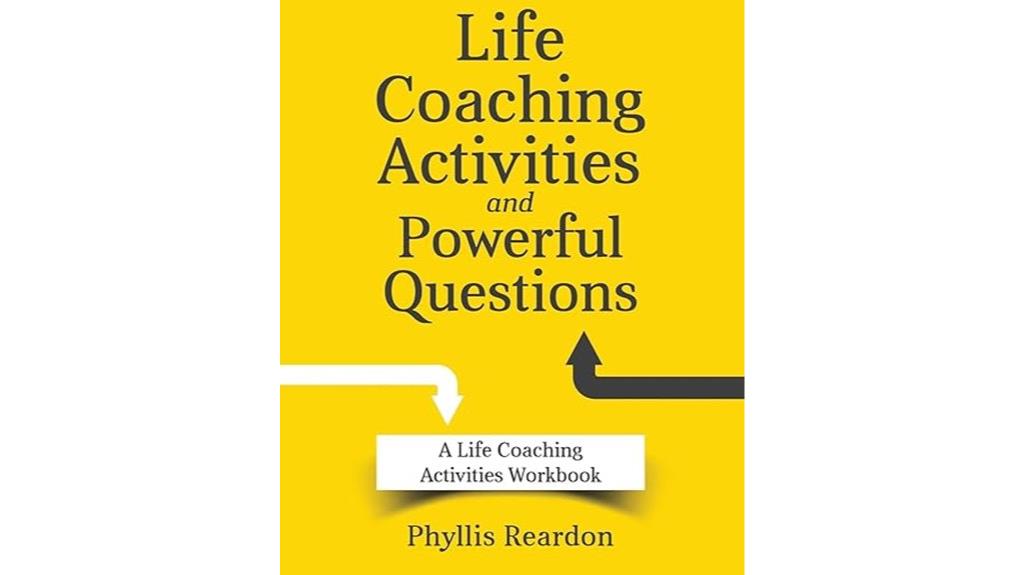
The Life Coaching Activities Workbook stands out as an essential resource for serious practitioners and individuals dedicated to self-improvement. I find it highly practical, offering exercises, quotes, and insights that foster self-awareness and goal clarity. Its flexible structure lets you read sequentially or pick relevant sections, making it adaptable for various coaching scenarios. The core focus on asking powerful questions, along with tools like the Wheel of Life, helps access deeper understanding and progress. Many users, including myself, appreciate its straightforward approach, which makes complex concepts accessible and actionable. It’s a valuable, long-term reference for anyone committed to growth and effective coaching.
Best For: serious life coaching practitioners and individuals seeking practical tools for self-awareness, goal setting, and personal growth.
Pros:
- Offers a comprehensive and straightforward workbook with practical exercises and insights.
- Highly flexible, allowing users to read sequentially or select relevant sections for different coaching scenarios.
- Emphasizes powerful questions and core coaching tools like the Wheel of Life to facilitate deep reflection and progress.
Cons:
- May not address negative life aspects as thoroughly, focusing more on positive strategies.
- The depth of inquiry can vary depending on the user’s needs and context.
- Some users might find certain scripting or questions less applicable to highly specific or complex coaching situations.
Atomic Habits: An Easy & Proven Way to Build Good Habits & Break Bad Ones

“Atomic Habits” stands out as a must-read for anyone seeking practical, science-backed strategies to build better habits and break bad ones. I love how it emphasizes small, consistent improvements—just 1% daily—that compound into remarkable long-term results. The book highlights the importance of identity-based change, encouraging us to focus on who we want to become rather than just goals. It explains the habit loop—cue, craving, response, reward—and how to leverage it to make good habits effortless. By designing environments that reduce friction and making habits attractive and satisfying, I’ve seen real change. It’s a practical guide to transforming your life, one tiny habit at a time.
Best For: Anyone looking to implement science-backed, practical strategies for developing good habits and breaking bad ones to achieve long-term personal growth.
Pros:
- Emphasizes small, consistent improvements that lead to significant long-term results.
- Focuses on identity-based change, fostering sustainable habits rooted in self-perception.
- Provides actionable tactics such as environment design and habit stacking to make habits easier and more attractive.
Cons:
- May require time and patience to see noticeable results due to the incremental approach.
- Some strategies might need personalized adaptation to fit individual lifestyles and environments.
- The focus on habits over goal-setting may be less motivating for those seeking immediate outcomes.
Best Self: Be You, Only Better

Best Self: Be You, Only Better stands out as an ideal choice for anyone ready to actively engage in their personal growth journey. I found this book to be a joyful, restorative guide that deepened my understanding of self-worth and personal reflection. Its practical, workbook format makes it easy to apply insights and track progress. Many readers, including myself, credit it with transforming lives—overcoming depression, building confidence, and boosting resilience. Coach Mike Bayer’s message that change is possible resonated deeply with me. This book isn’t just a read; it’s a hands-on tool for ongoing self-improvement, perfect for revisiting as you grow.
Best For: individuals committed to active self-improvement who want a practical, engaging, and reflective guide to personal growth.
Pros:
- Practical workbook format encourages active participation and ongoing use
- Highly recommended for overcoming challenges like depression and building confidence
- Accessible and easy-to-read with clear print and engaging content
Cons:
- Requires full commitment and consistency to see lasting results
- Some readers may initially find the activities or content boring or difficult to complete
- The need for personal accountability means it might not be as effective without dedicated effort
The Let Them Theory Book

If you’re looking for a practical way to protect your peace and reduce emotional exhaustion, The Let Them Theory Book offers valuable insights. It teaches you to let others be without trying to control or fix them, conserving your energy and mental clarity. This approach isn’t about passivity but about setting healthy boundaries and focusing on self-care. The book’s real-life examples and straightforward advice make it easy to apply in relationships, work, or personal growth. Many readers report feeling less overwhelmed, more relaxed, and more centered by embracing the idea of letting go of what’s outside your control. It’s truly a mindset shift worth exploring.
Best For: individuals seeking a practical, mindset-shifting approach to enhance their emotional well-being, set healthy boundaries, and reduce stress across personal and professional relationships.
Pros:
- Offers clear, real-life examples that make the concepts easy to understand and implement.
- Emphasizes mental health and self-care without promoting passivity.
- Suitable for both reading and listening, with engaging narration that enhances motivation.
Cons:
- Repetitive sections may feel redundant but serve to reinforce key ideas.
- Some readers might find the focus on letting go challenging or painful initially.
- The structure may focus more on mindset shifts than on detailed strategies for complex situations.

Are you looking for a practical guide that helps you steer coaching engagements with confidence? *Do Your Best Coaching: Navigating a Coaching Engagement* stands out as an essential resource for both new and experienced coaches aiming to manage every stage of the coaching process effectively. It offers a comprehensive roadmap, covering everything from initial chemistry meetings to post-engagement follow-up. With clear methodologies, practical tools like checklists and sample emails, and advice on stakeholder relationships, this book helps you build strong foundations and traverse challenges with ease. It’s a valuable reference to refine your skills and ensure productive, intentional coaching engagements.
Best For: both novice and experienced coaches seeking a practical, comprehensive guide to effectively manage coaching engagements from start to finish.
Pros:
- Offers a clear, step-by-step coaching roadmap with practical tools and resources.
- Provides valuable insights into stakeholder relationship management and engagement flow.
- Suitable for all experience levels, with relatable storytelling and actionable strategies.
Cons:
- The Kindle version may be somewhat generic, with limited access to detailed tools.
- Some readers might find the depth of content overwhelming without prior coaching experience.
- Focuses heavily on methodology, which may require adaptation for specific coaching niches.
You Are Not Required to Simplify Book Title
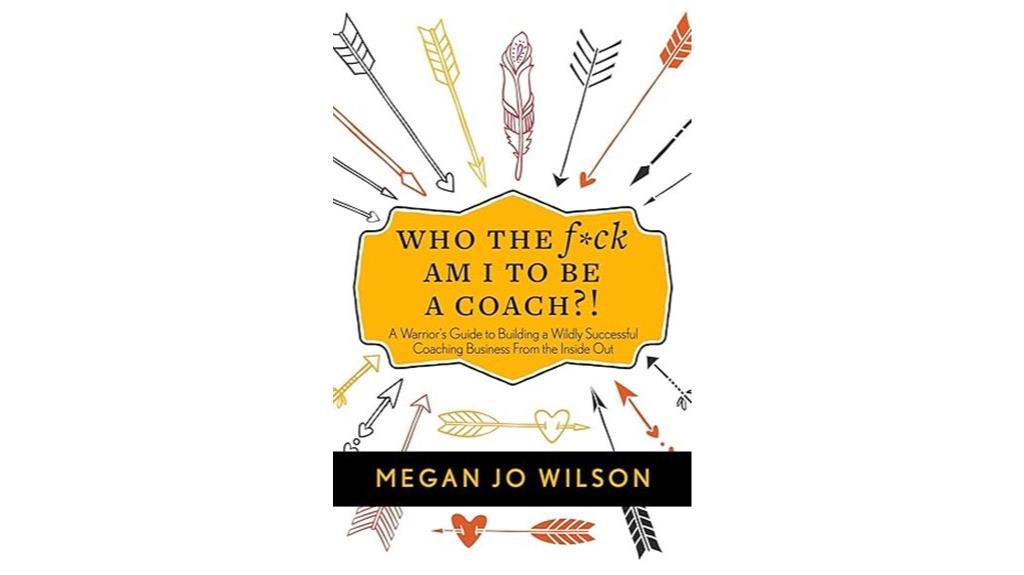
This list is perfect for anyone seeking straightforward, honest guidance on building a coaching business rooted in authenticity and purpose. The author’s journey—from Boy Scouts to military, tech support, and entrepreneurship—shows that coaching isn’t about a fancy title or simplified words. It’s about owning your unique story, faith, and divine guidance. His book emphasizes that you don’t need to water down your message; instead, trust your voice and purpose. Practical and real, it encourages embracing your authenticity, overcoming doubts, and confidently serving others. Sometimes, the best advice isn’t simplified but genuine—just like this inspiring resource.
Best For: individuals seeking honest, practical guidance to build a coaching business rooted in authenticity, purpose, and faith.
Pros:
- Offers straightforward, real-world advice that resonates with both beginners and seasoned coaches.
- Emphasizes the importance of owning your voice, purpose, and divine guidance.
- Incorporates personal stories, humor, and actionable steps to inspire confidence and clarity.
Cons:
- The spiritual language and concepts may not appeal to all audiences.
- Its brevity, while impactful, might leave some readers wanting more in-depth strategies.
- The informal tone could be perceived as less professional by certain readers seeking a more traditional approach.
Developing Coaching Skills: A Concise Introduction
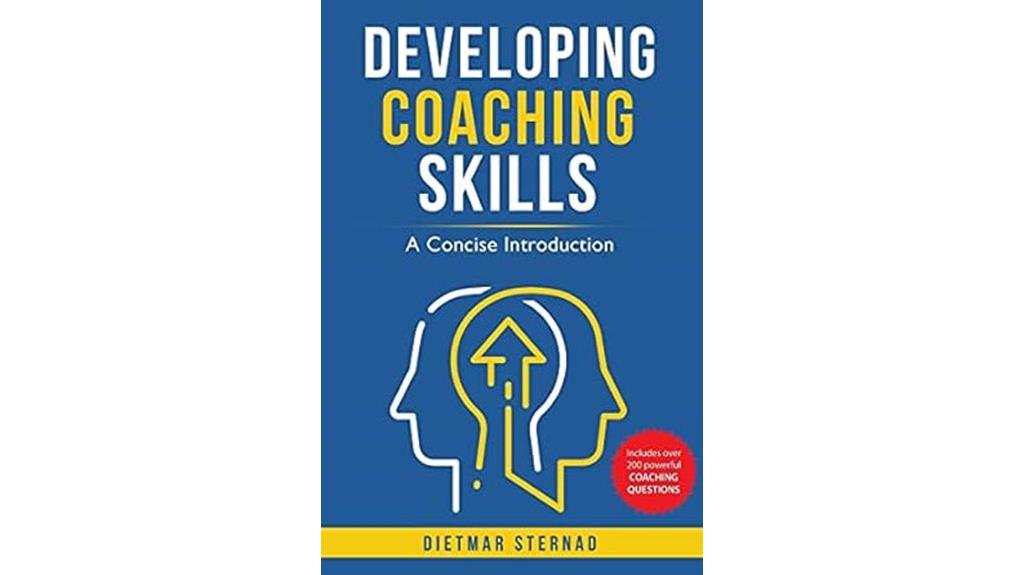
Developing coaching skills is essential for anyone looking to guide others effectively, whether you’re new to coaching or seeking to sharpen your abilities. I’ve found that understanding coaching fundamentals, such as active listening, asking powerful questions, and fostering self-discovery, makes a huge difference. This concise introduction covers practical techniques, tools, and case studies that provide immediate value. It’s perfect for beginners and experienced practitioners alike, emphasizing coaching’s role in leadership, personal growth, and communication. By mastering these core skills, you’ll become more impactful in guiding others, whether in professional settings or personal interactions.
Best For: Aspiring and experienced coaches, leaders, managers, and anyone interested in developing practical coaching skills for personal and professional growth.
Pros:
- Provides clear, concise guidance suitable for learners at different levels.
- Offers practical techniques, tools, and case studies for immediate application.
- Emphasizes core coaching skills like active listening, questioning, and fostering self-discovery.
Cons:
- As a brief introduction, it may lack in-depth exploration of advanced coaching concepts.
- Some readers might desire more extensive practice exercises or detailed case examples.
- Limited coverage of specific coaching niches or specialized coaching methodologies.
The Life Coaching Handbook
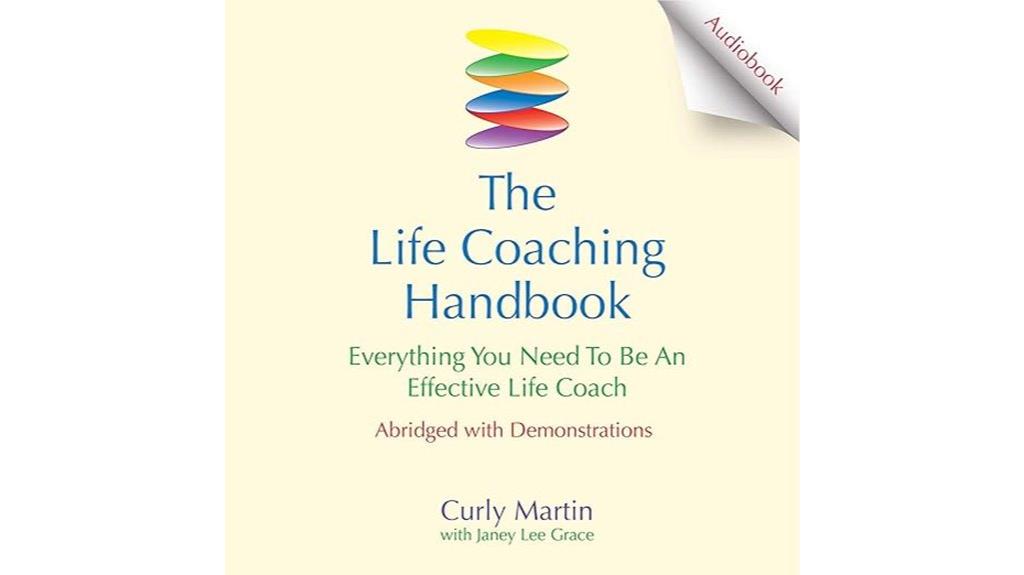
The Life Coaching Handbook stands out as an ideal resource for aspiring coaches seeking a structured, practical guide to building their skills. I appreciate its detailed guidance, covering everything from session organization to motivational techniques. Although some content feels a bit outdated, the book offers clear, step-by-step instructions with real-world examples that make complex concepts accessible. It’s especially helpful for beginners, providing a solid foundation and confidence to start coaching or grow a practice. I’ve found its straightforward approach and practical tips invaluable, and many readers, including myself, return to it repeatedly for guidance and inspiration.
Best For: aspiring life coaches seeking a practical, structured guide to develop their skills and build confidence in their coaching practice.
Pros:
- Provides detailed, step-by-step guidance with real-world examples for easy understanding
- Offers foundational techniques suitable for both beginners and experienced coaches
- Inspires confidence and motivation, encouraging ongoing learning and practice
Cons:
- Some content may feel outdated or superficial, especially regarding psychological techniques like NLP
- Limited depth on certain concepts, which might require supplementary resources for advanced learning
- Focused primarily on coaching, with less emphasis on deeper psychological or therapeutic methods
The HeART of Laser-Focused Coaching Book

If you’re a coach looking to deepen your impact and achieve rapid breakthroughs with clients, Marion Franklin’s *The HeART of Laser-Focused Coaching* offers invaluable techniques. Franklin’s method emphasizes deep listening, clear intention-setting, and uncovering core beliefs. Instead of traditional problem-solving, she guides you to explore your clients’ stories, motivations, and underlying themes quickly—often within 10-30 minutes. Her practical tools include frameworks for intention, identifying recurring themes, and impactful questioning. Many coaches report faster results and more profound insights using her approach, making it a must-have for anyone seeking to facilitate lasting change with efficiency and clarity.
Best For: coaches seeking to deepen their impact, achieve rapid breakthroughs, and facilitate lasting change through simple yet powerful techniques.
Pros:
- Provides practical, easy-to-implement tools for quick clarity and breakthroughs
- Emphasizes deep listening, intention, and uncovering core beliefs for transformational coaching
- Suitable for both novice and experienced coaches across various niches
Cons:
- May require practice to master the subtle art of impactful questioning and theme recognition
- Some users might find the short-format conversations challenging to adapt in complex cases
- Focuses heavily on core principles, which might necessitate additional resources for advanced techniques
Co-Active Coaching, Fourth Edition

For coaches seeking a solid foundation in core principles and practical techniques, “Co-Active Coaching, Fourth Edition” stands out as an essential resource. It offers clear frameworks, relatable examples, and actionable tools that deepen coaching sessions and improve client results. Recognized as a staple in certified coaches’ libraries, it emphasizes embodying coaching principles and harnessing potential. The book is engaging, easy to read, and perfect for both beginners and seasoned professionals. Many readers find that revisiting its insights enhances their skills, leading to more meaningful conversations and transformative outcomes for clients and themselves alike.
Best For: coaches seeking a comprehensive, practical foundation in core coaching principles and techniques to enhance their sessions and client outcomes.
Pros:
- Offers clear frameworks, relatable examples, and actionable tools for effective coaching.
- Recognized as a foundational resource, suitable for both beginners and experienced professionals.
- Easy to read and engaging, encouraging multiple revisits to deepen understanding.
Cons:
- May require some prior knowledge of coaching concepts for full benefit.
- As a broad overview, it might lack in-depth coverage of highly specialized coaching techniques.
- Some readers may find the practical tools need adaptation to fit specific coaching niches or styles.
The Greatness Mindset Book
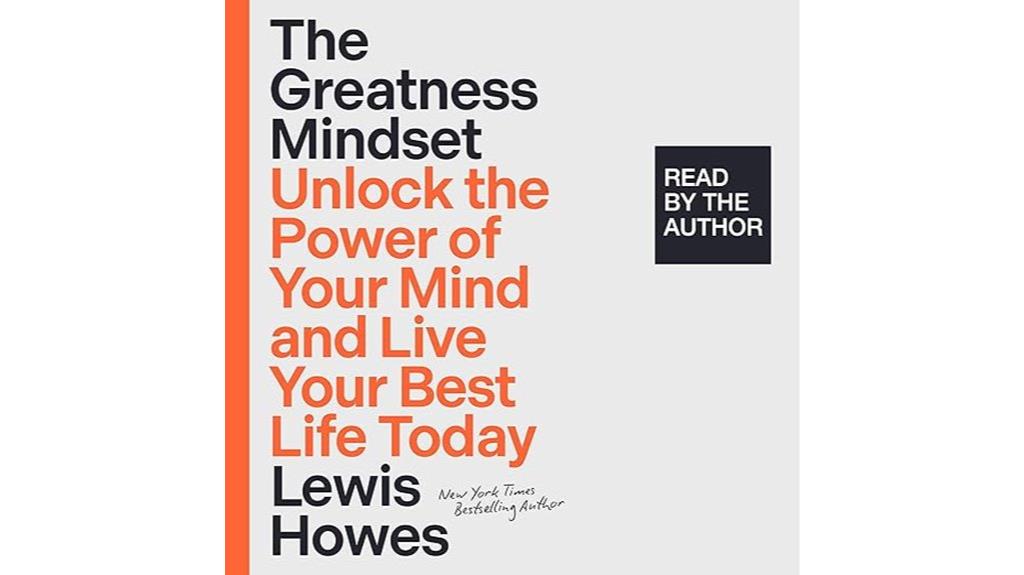
Anyone seeking a practical, insight-driven guide to unleash their inner potential will find The Greatness Mindset by Lewis Howes an invaluable resource. This book emphasizes self-awareness and mindset transformation, helping you discover and embrace your true self. It offers tools to rewire negative thoughts, conquer self-doubt, and cultivate a growth-oriented mindset. With inspiring stories, quotes, and exercises, it encourages continuous self-discovery at any life stage. Whether you’re overcoming fears or defining your purpose, Howes guides you to live intentionally and pursue your unique mission. It’s a powerful manual for building resilience, confidence, and lasting change to achieve your greatest potential.
Best For: individuals at any life stage seeking practical strategies to boost self-awareness, overcome self-doubt, and live purposefully with confidence.
Pros:
- Provides actionable tools backed by science to rewire negative thought patterns
- Incorporates inspiring stories, quotes, and exercises for continuous self-discovery
- Encourages a growth mindset and living intentionally aligned with personal purpose
Cons:
- May require consistent effort and self-reflection to see significant change
- Some readers might find the exercises too simple or repetitive
- The focus on mindset transformation may not address deeper psychological or external obstacles
This is Coaching Book on Transforming Clients’ Performance and Life
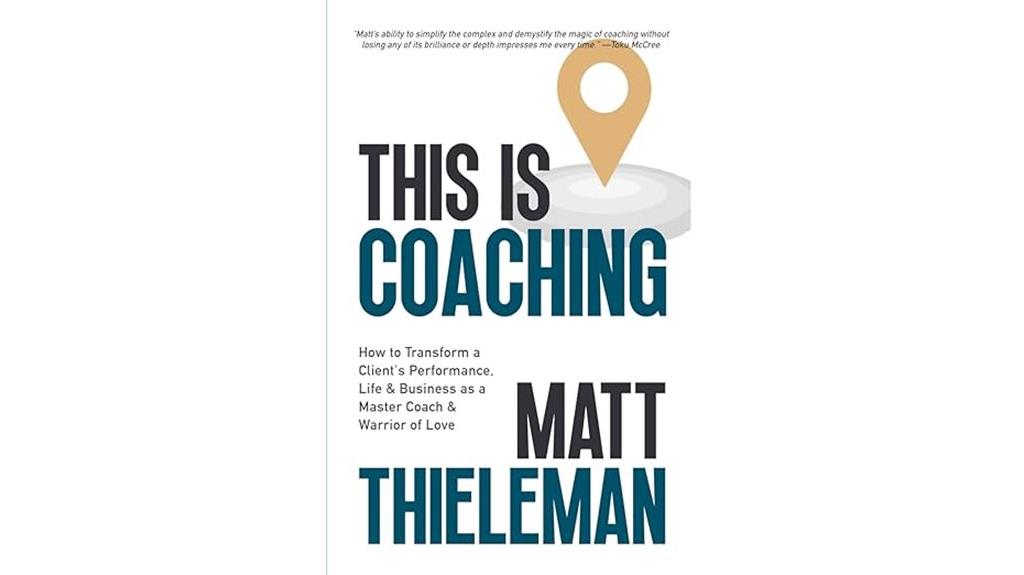
This coaching book stands out as an essential resource for both new and experienced practitioners seeking to transform their clients’ performance and life. “This is Coaching” by Matt Thieleman emphasizes a simple, heart-centered approach rooted in spiritual clarity, compassion, and love. It encourages coaches to cultivate empathy, trust, and genuine connection rather than relying on complex techniques. Filled with practical exercises, real-world examples, and clear strategies, the book helps coaches and clients move toward meaningful change. Its focus on self-awareness, authenticity, and living in alignment makes it a powerful tool for fostering lasting growth and transformation.
Best For: Coaches, leaders, and individuals seeking a heart-centered, practical approach to transforming performance and life through self-awareness and authentic connection.
Pros:
- Emphasizes simplicity, compassion, and spiritual clarity over complex techniques
- Provides practical exercises, real-world examples, and clear strategies for immediate application
- Supports personal growth for both coaches and clients, fostering lasting transformation
Cons:
- May require a mindset shift for those accustomed to more technical coaching methods
- Some readers might prefer more advanced or specialized coaching tools
- The focus on heart-centered approaches may not resonate with all professional coaching styles
Do Your Best Coaching: The Workbook

Do Your Best Coaching: The Workbook stands out as an essential resource for both new and experienced coaches who want practical, hands-on tools to deepen their coaching practice. It complements the main book by offering templates, tips, and real-world examples tailored to each coaching phase. The workbook guides you through building the coaching container, managing sessions, and uncovering meaningful insights at the end. Its structured approach helps you navigate complex scenarios while encouraging authenticity. Many find it invaluable for reinforcing fundamentals, providing actionable ideas, and enhancing their skills. Despite some layout critiques, this resource is highly effective for continuous growth and mastery in coaching.
Best For: coaches of all experience levels seeking practical, structured tools and real-world guidance to enhance their coaching skills and client engagement.
Pros:
- Provides comprehensive templates, tips, and examples tailored to each coaching phase
- Supports continuous growth and mastery with practical, actionable resources
- Suitable for both new and experienced coaches, including those working with leaders
Cons:
- Layout can be crowded with too much text, making it less inviting and harder to read
- Some users find the information repetitive or already known, reducing perceived value
- May require additional effort to adapt the materials to individual coaching styles
Factors to Consider When Choosing Life Coaching Books

When choosing a life coaching book, I focus on how well it aligns with my goals and offers practical tips I can apply immediately. I also consider the author’s expertise level to confirm I’m learning from credible sources, and I look for content that matches my preferred engagement style. These factors help me select books that truly make a difference in my personal growth journey.
Relevance to Goals
How can you guarantee that a life coaching book truly supports your goals? First, verify the content aligns with your specific coaching objectives, whether that’s personal growth, leadership, or niche topics. Look for resources that focus on the skills or techniques you want to develop, like questioning, active listening, or creating coaching plans. It’s also important to choose books suited to your current stage—beginner, intermediate, or advanced—to match your needs. Additionally, select materials that reflect your preferred coaching style, whether transformational, solution-focused, or spiritually aligned. Finally, consider whether the book emphasizes practical exercises or theoretical insights, depending on whether you need to build skills quickly or deepen your understanding. This focused approach guarantees relevance to your goals.
Practical Application Tips
Choosing the right life coaching book involves focusing on practical features that promote real-world application. Look for books that include exercises, worksheets, or tools you can actively engage with, ensuring you can apply concepts immediately. Clear, step-by-step guidance helps translate ideas into actionable strategies, making implementation easier. Books that feature case studies, sample dialogues, or scenarios demonstrate how techniques work across different coaching situations, boosting your confidence. Reflection prompts or questions deepen self-awareness and enhance client insights during sessions. Additionally, prioritizing titles with interactive components like journaling, planning, or role-playing helps reinforce learning and skill-building. By selecting books with these practical elements, you’ll find it easier to turn knowledge into effective coaching practices that truly transform your mindset and help you achieve your goals.
Author Expertise Level
The expertise level of an author considerably impacts the credibility and usefulness of a life coaching book. When choosing a book, I look for authors with strong professional backgrounds, certifications, or significant practical experience. Authors with extensive credentials or industry recognition tend to offer more reliable, evidence-based insights that I can trust. These writers often have a proven track record through successful coaching practices, publications, or contributions to research. While beginners or less experienced authors might share inspiring personal stories or foundational ideas, I prioritize expertise to guarantee the techniques are applicable and aligned with industry standards. Evaluating an author’s credentials helps me select books that truly enhance my mindset and support my goals effectively.
Depth of Content
When evaluating life coaching books, I find that depth of content plays a crucial role in how much I can learn and apply. Deeper books usually cover core principles, techniques, and advanced strategies, offering a richer learning experience. I look for detailed exercises, case studies, and reflective questions that help translate concepts into practice. The best books explore underlying psychological theories, coaching models, and frameworks, which deepen my understanding of coaching dynamics. The level of detail also prepares me for complex client situations, making depth essential for tackling diverse challenges. When choosing a book, I consider my experience and goals. Beginners might prefer concise guides, while seasoned practitioners benefit from comprehensive, in-depth resources that foster mastery.
Engagement Style
How can you tell if a life coaching book will keep you engaged and motivated? Look for an engaging, conversational tone that makes complex ideas simple and relatable. Check if the book includes interactive elements like exercises, reflection prompts, or practical tools—these foster active learning and help you apply concepts. Notice if the writing uses humor, stories, or relatable examples; these keep your interest alive and boost motivation. Also, consider varied formats like workbooks or visual aids, which cater to different learning styles. Finally, choose resources that balance theory with practical application. Such books not only inform but also inspire ongoing growth, ensuring you stay invested in your journey toward transformation.
Frequently Asked Questions
How Do I Select the Best Coaching Book for My Needs?
When choosing a coaching book, I start by identifying my specific goals and challenges. I look for books that address those areas directly and resonate with my learning style. I also check reviews and author credibility. Personal recommendations and sample chapters help me determine if the content feels engaging and practical. Ultimately, I pick a book that inspires me to grow and aligns with my mindset and aspirations.
Can These Books Address Specific Personal or Professional Goals?
When I consider if coaching books can address specific goals, I think of Sarah, who wanted a career change. She found a book tailored to professional growth that offered practical steps. These books often include targeted strategies for personal or professional goals, making them adaptable. I believe selecting one aligned with your unique objectives can provide valuable insights and motivation to reach your desired outcomes.
Are There Recommended Books for Beginner Versus Advanced Coaches?
You’re asking if there are recommended books for beginner versus advanced coaches. I’d say yes, I recommend starting with foundational books like “The Coaching Habit” for beginners to build essential skills. For advanced coaches, I suggest exploring more in-depth texts like “Mastering Coaching” to deepen your expertise. Tailoring your reading to your experience level helps you grow steadily and stay challenged. Keep learning, and you’ll continually elevate your coaching game.
Do These Books Include Practical Exercises or Just Theoretical Concepts?
I’ve found that most of these coaching books are like treasure chests—they often include practical exercises alongside theoretical concepts. Some are hands-on, guiding you step-by-step, while others focus more on expanding your mindset with insightful ideas. I recommend choosing books that blend both, so you can learn new strategies and apply them directly to your coaching practice or personal growth journey.
How Often Should I Revisit Coaching Books to See Progress?
I believe revisiting coaching books depends on your progress and needs. I personally check in every few months to refresh concepts and stay motivated. If I notice new challenges or feel stuck, I revisit specific sections or exercises. Regularly revisiting helps reinforce growth, but it’s important to listen to yourself and adjust frequency as you evolve. Consistency is key to transforming insights into lasting change.
Conclusion
If you’re truly committed to transforming your mindset, these books are your Excalibur, guiding you through the maze of self-improvement. Think of them as your trusty compass in a world where even a knight needs direction. With each page, you’ll forge a stronger, better version of yourself—no need to wait for a magic wand. Remember, the journey to greatness is ongoing, much like the timeless pursuit of wisdom across ages.









